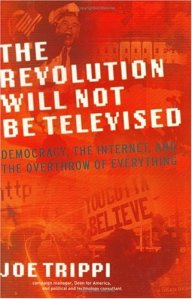The conventional wisdom has it that Justin Trudeau has the leadership of the Liberals all but in the bag. Well, all I can say is that the conventional wisdom is ill-informed, and I believe that the contest is a whole lot closer than it appears.
First off, Joyce Murray has a lot more supporters than was publicly suspected. According to her campaign, they actually managed to register 45,000 supporters through their third-party recruiting drive. Yes, I said register to vote, not sign up as supporters. As I posted some weeks ago, Joyce Murray was pretty smart when she targeted a massive, well organised, and highly motivated online community in her supporter drive. It did not require a massive labour intensive process to succeed, because the communications tool utilised, (electronic) is basically free, and the motivation of her erstwhile target group is STRONG. That ease of communications, and strong motivation has manifested itself again by the very high rate of conversion of Murray Supporters to registered voters. That does not surprise me in the least, as I blogged here. As a former Green, I know that the Democratic reform advocates are more deeply motivated than most Canadians, and since the means of recruiting them, via email made it very easy to register, it was inevitable that their numbers would be strong. So based upon the raw numbers, Joyce probably has more registered supporters than Trudeau, while Trudeau probably has a big edge in paid up members.
The Trudeau Campaign is in a very different place. Despite all the hoopla about 170,000 Supporters, the Trudeau campaign recruited a large number of them through their phone banks, NOT through email or online campaigns. The down-side of this is that there was a built-in bias AGAINST Trudeau rooted in the means of acquiring those supporters. They reached them, one at a time by telephone, so a great many of them had no email address on file. This meant that given the very short time frame to register to vote, only a fraction of the Trudeau supporters will have ended up being eligible to vote. Trudeau has got to be chewing his fingernails by now, if the conversion rate for supporters to registered voters was so very lame, are his registered supporters sufficiently motivated to actually cast their ballot after all? I have zero information to share on that score, except the general observation that Joyce’s supporters are going to turn out in very large numbers, and Trudeau’s supporter turnout will definitely be lower. On raw vote counts, it will be extremely close, but that does not mean that Trudeau will lose.
You see, there is something to be said for clunky, old-fashioned, slow and expensive phone banks. Every contact can be targeted. While Joyce was racking up big numbers of supporters, she could not control WHERE THEY CAME FROM. Boy, is she gonna ROCK BC! Actually, she is going to just sweep aside everybody else in BC, and there will be a titanic battle in Urban centres across Canada. But superior organisation, and the highly targeted phone campaign by the Trudeau team will still likely tip the balance. The reason is that despite the very low registration rates ‘enjoyed’ by team Trudeau, their conversions are going to yield a very efficient vote. By efficient, I mean that they are going to win maybe 100, maybe more ridings by just a handful of votes. So there it is, I predict that Joyce will be in a dead heat with Trudeau in terms of ballots cast, but unless Trudeau’s turnout is really really pitiful, he shall win it in rural Nova Scotia, and across the Province of Quebec. It is going to be close though, so nobody should loaf around figuring it is in the bag.
So what to do with Joyce once the dust settles? Well, she has proven something very specific and relevant to the Liberals fortunes. Look at this very interesting article on election results based upon polled intentions of the electorate under a preferential ballot system, ( Actually, that is official Liberal Policy for democratic reform). The outcomes are extremely favourable for every party except the Conservative Party. That makes intuitive sense because the Conservatives have pursued a deliberate policy of solidifying support from their issue sensitive base by contrasting it against, and vilifying those who disagree with them. Hmm, not very conducive for being liked by at least some of your opponents. So preferential ballots are good for the Liberal Party. Joyce has proven something else. Democratic reform is a very strong motivator. It is capable of drawing tens of thousands of supporters in from different party’s, and those supporters mean business. While Joyce pulled in maybe 50,000 names, the sheer size of the Leadnow, Fair Vote, etc memberships suggests that there are as many as a million motivated Canadians standing behind electoral reform. So here is some food for thought, Joyce should be offered the job of building up a strongly motivated community of Liberals, dedicated to bringing Preferential ballots, or a Royal Commission on electoral reform to Canadians, just as soon as the Liberals form the next Government. There is plenty of time to turn this issue into a Liberal issue before the next election. Put half a million democratic reform supporters into Liberalist, and there will be an amazing number of pony tailed-activists canvassing in YOUR riding for YOUR candidate in 2015. And the money, Oh La La! Joyce will have plenty of funds to carry the electoral reform message to the electorate. People who really care will respond well to asks for time and money to support their cause. And guess what? If it succeeds, the Liberal Party will have a permanent advantage with the introduction of preferential ballots, because there they are, with a brand that has very broad appeal indeed! And if it doesn’t succeed? Well, the democratic reform advocates have been patient and are used to not succeeding. They will dig in their heels, and organise an even stronger community for the next election.
Vote for this post at progressive Bloggers!
Filed under: Building the Database, Electoral Data, Engaging Supporters, Liberal Leadership Contest, Organizing | Tagged: election readiness, Liberal Party, political organizing, Political Upset | 4 Comments »














































